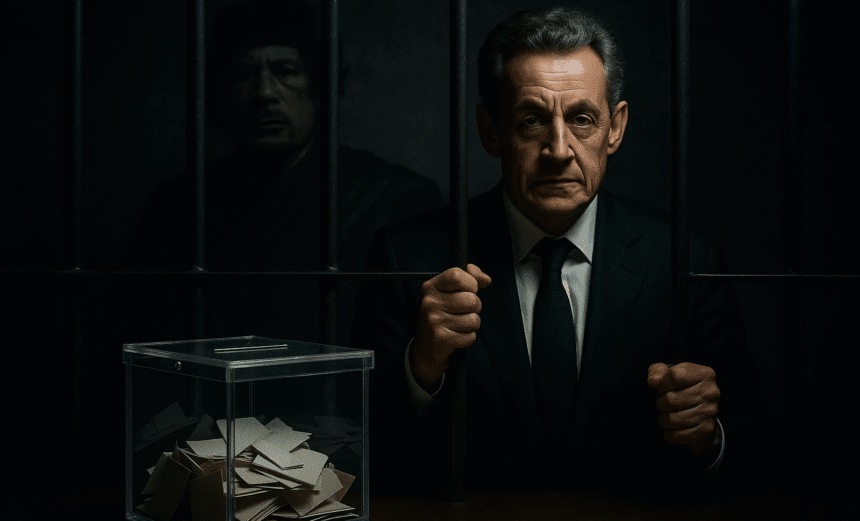In a historic ruling, a Paris criminal court has found former French President Nicolas Sarkozy guilty of criminal conspiracy in connection with alleged illegal financing of his 2007 presidential campaign. The court sentenced Sarkozy to five years in prison, marking the first time in modern French history that a former head of state has been handed an actual custodial sentence. The verdict was delivered at the Tribunal de Paris on Thursday, 25th September, 2025, bringing to a close a decade-long investigation and a highly charged trial that began in January 2025.
The judges ruled that Sarkozy had orchestrated a network of covert contacts and arrangements amounting to criminal conspiracy, though they acquitted him of the more serious charges of illegal campaign financing, passive corruption, and concealment of embezzlement of public funds. While prosecutors were unable to prove that money from Libya reached Sarkozy’s campaign coffers, the court found that his repeated engagement with intermediaries, including Libyan officials and businessmen, established a clandestine plan to seek foreign support. Prosecutors had originally sought a seven-year prison term, a €300,000 fine, and a five-year ban from public office, portraying the affair as “high-intensity corruption.” Ultimately, the court sentenced him to five years, with no delay in the start of his incarceration, even if he appeals.
At the heart of the case were allegations that Sarkozy struck a covert deal with Libyan leader Muammar Gaddafi to finance his 2007 election campaign. Investigators pointed to testimonies, suspicious cash transfers, and the diaries of Shukri Ghanem, Libya’s former oil minister, which suggested that payments were promised to Sarkozy. Over the years, allegations surfaced of suitcases filled with cash, shadowy meetings, and Libyan intermediaries, among them businessman Ziad Takieddine. Takieddine’s sudden death just days before the verdict deprived the court of further cross-examination. Despite the gaps, prosecutors maintained that the conspiracy itself was undeniable: Sarkozy and his aides knowingly courted foreign funding in violation of French law and democratic norms.
The court also delivered sentences against Sarkozy’s close associates. Claude Guéant, his former chief of staff, received six years, while longtime ally Brice Hortefeux was sentenced to two years, including measures such as house arrest. Several other defendants were acquitted. Judges highlighted the “exceptional seriousness” of attempting to compromise French democracy by seeking foreign money, stressing the corrosive impact such schemes have on public trust in institutions.
Sarkozy, accompanied by his wife Carla Bruni-Sarkozy, reacted defiantly to the ruling, denouncing it as a “scandal” and insisting he had never taken money from Gaddafi. “If they want me to sleep in prison, I will do so but with my head held high,” he declared outside the courtroom, vowing to appeal the decision. His lawyers argued that the case had been politically motivated from the outset and criticized the reliance on testimonies from deceased or discredited witnesses.
This latest conviction deepens Sarkozy’s already complex legal troubles. In 2021, he was found guilty in the so-called “wiretap” case, which involved attempts to bribe a judge, and was sentenced to three years, two of them suspended. That conviction is still under appeal. He was also convicted in the Bygmalion scandal, which exposed overspending in his failed 2012 re-election campaign, and in 2023, an appeals court upheld a one-year sentence to be served under electronic monitoring. These overlapping legal battles have steadily eroded Sarkozy’s reputation, once that of a dynamic reformer who swept into the Élysée Palace promising to modernize France.
The Libyan financing trial was by far the most politically explosive. It not only raised questions about the integrity of French elections but also implicated a now-dead dictator in one of the most controversial episodes of Franco-Libyan relations. For years, Sarkozy had positioned himself as a strong critic of Gaddafi, even ordering French forces into Libya in 2011 to help overthrow him. Yet the allegations suggested that the very man he later helped depose may have secretly bankrolled his rise to power.
The ruling carries symbolic and political weight far beyond Sarkozy’s personal fate. For supporters, his conviction signals that France’s judiciary is independent and unafraid to challenge powerful figures. For critics, the acquittals on the core financial charges expose the limits of the evidence, raising questions about whether justice has been selectively applied. In any case, the appeal process is expected to stretch on for months, if not years, ensuring the case remains a flashpoint in French politics.
Sarkozy’s conviction also divides the French right. Some conservatives view him as a victim of judicial persecution, while others see his downfall as a cautionary tale about the dangers of entangling politics with money and foreign influence. For the French public, the ruling underscores the fragility of democratic institutions and the high stakes of corruption at the very top of government.
With his appeal imminent, Sarkozy faces the prospect of becoming the first French president in modern times to serve time behind bars. Whether he ultimately sleeps in prison or wins a reprieve in higher courts, the verdict cements his place in history not only as a president but also as a cautionary example of the legal and moral limits of political ambition.














